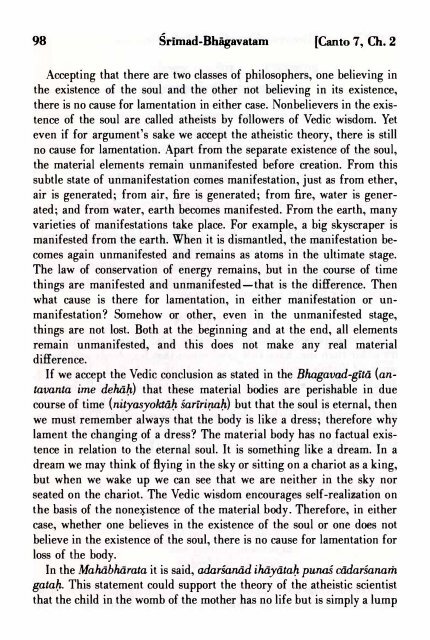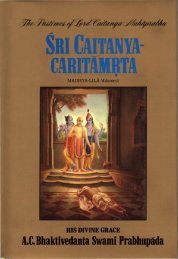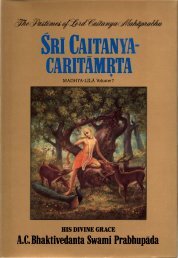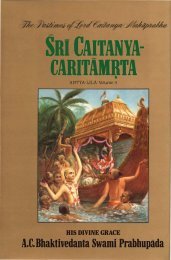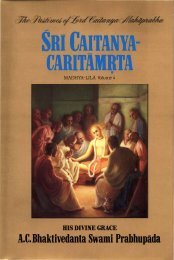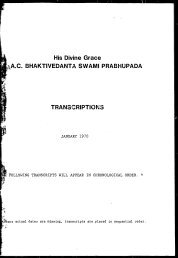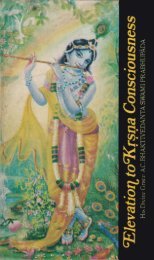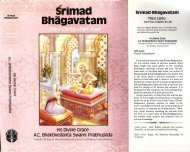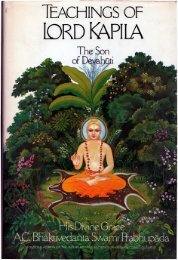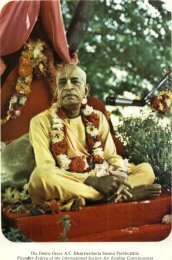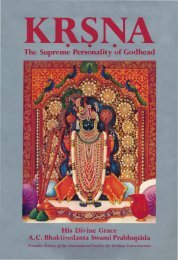- Page 1:
ALL GLORY TO 5Rl GURU AND GAURANGAS
- Page 4 and 5:
Readers interested in the subject m
- Page 6 and 7:
VtSrimad-BhagavatamThe Material Cre
- Page 8 and 9:
PrefaceWe must know the present nee
- Page 10 and 11:
PrefaceXlniimany anantasya ya.So 'n
- Page 12 and 13:
xwSrrrnad-BhagavabunSukadeva Gosvam
- Page 14 and 15:
His Divine GraceA. C. Bhaktivedanta
- Page 17:
PLATE TWOOnce, when the four sons o
- Page 21:
PLATE FOURLord Brahma, who is carri
- Page 25:
PLATE SIXAfter being ordered by Hir
- Page 29 and 30:
CHAPTER ONEThe Supreme Lord Is Equa
- Page 31 and 32:
Text 2] The Supreme Lord Is Equal t
- Page 33 and 34:
Text 3] The Supreme Lord Is Equal t
- Page 35 and 36:
Text 6] The Supreme Lord Is Equal t
- Page 37 and 38:
Text 7] The Supreme Lord Is Equal t
- Page 39 and 40:
Text 8]The Supreme Lord Is Equal to
- Page 41 and 42:
Text 9] The Supreme Lord Is Equal t
- Page 43 and 44:
Text 9) The Supreme Lord Is Equal t
- Page 45 and 46:
Text ll) The Supreme Lonl Is Equal
- Page 47 and 48:
Text 12] The Supreme Lord Is Equal
- Page 49 and 50:
Text 13] The Supreme Lord Is Equal
- Page 51 and 52:
Text 16] The Supreme Lord Is Equal
- Page 53 and 54:
Text 19] The Supreme Lord Is Equal
- Page 55 and 56:
Text 22]The Supreme Lord Is Equal t
- Page 57 and 58:
Text 24] The Supreme Lord Is Equal
- Page 59 and 60:
Text 25] The Supreme Lord Is Equal
- Page 61 and 62:
Text 26] The Supreme Lord Is Equal
- Page 63 and 64:
Text 26]The Supreme Lord Is Equal t
- Page 65 and 66:
Text 27]The Supreme Lord Is Equal t
- Page 67 and 68:
Text 29)The Supreme Lord Is Equal t
- Page 69 and 70:
Text 30) The Supreme Lord Is Equal
- Page 71 and 72:
Text 32] The Supreme Lord Is Equal
- Page 73 and 74:
Text 34]The Supreme Lord Is Equal t
- Page 75 and 76: Text 35] The Supreme Lord Is Equal
- Page 77 and 78: Text 37] The Supreme Lord Is Equal
- Page 79 and 80: Text 39] The Supreme Lord Is Equal
- Page 81 and 82: Text 43] The Supreme Lord Is Equal
- Page 83 and 84: Text 45] The Supreme Lord Is Equal
- Page 85 and 86: Text 48] The Supreme Lord Is Equal
- Page 87 and 88: CHAPTER TWOHiryakaSipu, King of the
- Page 89 and 90: Text 3) Hiryaka.Sipu, King of the D
- Page 91 and 92: Text 6] Hiral_lyaka8ipu, King of th
- Page 93 and 94: Text 8] Hiryak&Sipu, King of the De
- Page 95 and 96: Text 10]Hirw.tyaka8ipu, King of the
- Page 97 and 98: Text 10) Hiryaka8ipu, King of the D
- Page 99 and 100: Text II)Hiryaka8ipu, King of the De
- Page 101 and 102: Text 12] Hiryaka8ipu, King of the D
- Page 103 and 104: Text 14] Hiryaka8ipu, King of the D
- Page 105 and 106: Text 15]HiraJ;lyaka8ipu, King of th
- Page 107 and 108: Text 19]Hirtu;yak&Sipu, King of the
- Page 109 and 110: Text 21]Hiryak&Sipu, King of the De
- Page 111 and 112: Text 22]Hir81}yaka8ipu, King of the
- Page 113 and 114: Text 24) Hirayak&Sipu, King of the
- Page 115 and 116: Text 26) Hiryaka8ipu, King of the D
- Page 117 and 118: Text 31] HiraJ.Iyaka8ipu, King of t
- Page 119 and 120: Text 32] Hiryaka8ipu, King of the D
- Page 121 and 122: Text 34]Hirw;tyak&Sipu, King of the
- Page 123 and 124: Text 36] Hiryak&Sipu, King of the D
- Page 125: Text 37]Hira1,1yaka8ipu, King of th
- Page 129 and 130: Text 39]HiraJ;Iyaka8ipu, King of th
- Page 131 and 132: Text 41] Hiryaka8ipu, King of the D
- Page 133 and 134: Text 43]Hiryaka8ipu, King of the De
- Page 135 and 136: Text 44] Hiryaka8ipu, King of the D
- Page 137 and 138: Text 46] Hiral}yak&Sipu, King of th
- Page 139 and 140: Text 47) Hiryaka8ipu, King of the D
- Page 141 and 142: Text 48] HiraJ,lyak8Sipu, King of t
- Page 143 and 144: Text 50)Hiryaka8ipu, King of the De
- Page 145 and 146: Text 54] Hiryaka8ipu, King of the D
- Page 147 and 148: Text 56) Hirm:tyaka8ipu, King of th
- Page 149 and 150: Text 58] Hiryak&Sipu, King of the D
- Page 151 and 152: Text 60]Hirai].yaka8ipu, King of th
- Page 153 and 154: Text 60] HiraJ.lyaka8ipu, King of t
- Page 155 and 156: Text 61] Hiryaka8ipu, King of the D
- Page 157 and 158: 130 Srnnad-Bhagavabun (Canto 7, Ch.
- Page 159 and 160: 132 Srimad-Bhigavatam(Canto 7, Ch.
- Page 161 and 162: 134 Srimad-Bhigavatam (Canto 7, Ch.
- Page 163 and 164: 136 Srimad-Bhagavatam[Canto 7, Ch.
- Page 165 and 166: 138 Srimad-Bhiigavatam (Canto 7, Ch
- Page 167 and 168: 140 Srimad-Bhigavatam [Canto 7, Ch.
- Page 169 and 170: 142 Srimad-Bhiigavatam [Canto 7, Ch
- Page 171 and 172: 144 Srnnad-Bhigavabun [Canto 7, Ch.
- Page 173 and 174: 146 Srnnad-Bhigavabun [Canto 7, Ch.
- Page 175 and 176: 148Srimad-Bhagavatam[Canto 7, Ch. 3
- Page 177 and 178:
150 Srimad-Bhagavatam[Canto 7, Ch.
- Page 179 and 180:
152 Srbnad-BbagavaUun [Canto 7, Ch.
- Page 181 and 182:
154 SrUnad-Bhigavabun [Canto 7, Ch.
- Page 183 and 184:
156 Srbnad-Bhigavabun [Canto 7, Ch.
- Page 185 and 186:
158 Srimad-Bhiigavatam [Canto 7, Ch
- Page 187 and 188:
160 Srbnad-Bhigavabun [Canto 7, Ch.
- Page 189 and 190:
162 Srnnad-Bhagavabun (Canto 7, Ch.
- Page 191 and 192:
164 Srnnad-Bhigavabun [Canto 7, Ch.
- Page 193 and 194:
166 Srimad-Bhagavatam [Canto 7, Ch.
- Page 195 and 196:
168Srimad-Bhigavatam [Canto 7, Ch.
- Page 197 and 198:
170 Srimad-Bhagavatam [Canto 7, Ch.
- Page 199 and 200:
172 Srimad-Bhigavatam[Canto 7, Cb.
- Page 201 and 202:
174 Srnnad-Bhigavabun [Canto 7, Ch.
- Page 203 and 204:
176 Srimad-Bhigavatam (Canto 7, Ch.
- Page 205 and 206:
178 Srimad-Bhigavatam [Canto 7, Ch.
- Page 207 and 208:
180 Srimad-Bhigavatam (Canto 7, Ch.
- Page 209 and 210:
182 Srimad-Bhagavatam (Canto 7, Ch.
- Page 211 and 212:
184 Srimad-Bhigavatam [Canto 7, Ch.
- Page 213 and 214:
186 Srimad-Bhigavatam (Canto 7, Ch.
- Page 215 and 216:
188 Srimad-Bhigavatam [Canto 7, Ch.
- Page 217 and 218:
190 Srimad-Bhigavatam [Canto 7, Ch.
- Page 219 and 220:
192 Srimad-Bhigavatam[Canto 7, Cb.
- Page 221 and 222:
194 Srimad-Bhigavatam[Canto 7, Ch.
- Page 223 and 224:
196 Srimad-Bhagavatam (Canto 7, Ch.
- Page 225 and 226:
198 Srimad-Bhigavatam (Canto 7, Ch.
- Page 227 and 228:
200 Srimad-Bhigavatam [Canto 7, Ch.
- Page 229 and 230:
202 Srimad-Bhigavatam [Canto 7, Ch.
- Page 231 and 232:
204 Srimad-Bhigavatam (Canto 7, Ch.
- Page 233 and 234:
206 Srimad-Bhigavatam (Canto 7, Ch.
- Page 235 and 236:
208 Srimad-Bhigavatam(Canto 7, Ch.
- Page 237 and 238:
210 Srimad-Bhigavatam(Canto 7, Ch.
- Page 239 and 240:
212 Srimad-Bhigavatam[Canto 7, Ch.
- Page 241 and 242:
CHAPTER FIVEPrahlada Maharaja,the S
- Page 243 and 244:
Text 2]Prahlid the Saintly Son of H
- Page 245 and 246:
Text 4] Prahlada, the Saintly Son o
- Page 247 and 248:
Text 5]Prahlida, the Saintly Son of
- Page 249 and 250:
Text 6] Prahlida, the Saintly Son o
- Page 251 and 252:
Text 7]Prahlida, the Saintly Son of
- Page 253 and 254:
Text 10] Prahlida, the Saintly Son
- Page 255 and 256:
Text 11] Prahlida, the Saintly Son
- Page 257 and 258:
Text 12] Prahlida, the Saintly Son
- Page 259 and 260:
Text 12] Prahlida, the Saintly Son
- Page 261 and 262:
Text 14] Prahlida, the Saintly Son
- Page 263 and 264:
Text 15] Prahlida, the Saintly Son
- Page 265 and 266:
Text 17] Prahlida, the Saintly Son
- Page 267 and 268:
Text 18] Prahlida, the Saintly Son
- Page 269 and 270:
Text 20] Prahlada, the Saintly Son
- Page 271 and 272:
Text 22] Prahlida, the Saintly Son
- Page 273 and 274:
Text 24] Prahlada, the Saintly Son
- Page 275 and 276:
Text 24] Prahlida, the Saintly Son
- Page 277 and 278:
Text 24) Prahlida, the Saintly Son
- Page 279 and 280:
Text 24] Prahlida, the Saintly Son
- Page 281 and 282:
Text 24] Prahlada, the Saintly Son
- Page 283 and 284:
Text 24] Prahlada, the Saintly Son
- Page 285 and 286:
Text 24] Prahlida, the Saintly Son
- Page 287 and 288:
Text 24] Prahlida, the Saintly Son
- Page 289 and 290:
Text 27] Prahlada, the Saintly Son
- Page 291 and 292:
Text 29] Prahlida, the SaintlY. Son
- Page 293 and 294:
Text 30] Prahlada, the Saintly Son
- Page 295 and 296:
Text 31] Prahlida, the Saintly Son
- Page 297 and 298:
Text 32) Prahlida, the Saintly Son
- Page 299 and 300:
Text 33] Prahlida, the Saintly Son
- Page 301 and 302:
Text 36] Prahliida, the Saintly Son
- Page 303 and 304:
Text 38] Prahlida, the Saintly Son
- Page 305 and 306:
Text 41] Prahlida, the Saintly Son
- Page 307 and 308:
Text 44] Prahlida, the Saintly Son
- Page 309 and 310:
Text 46] Prahlada, the Saintly Son
- Page 311 and 312:
Text 49] Prahlida, the Saintly Son
- Page 313 and 314:
Text 51] Prahlada, the Saintly Son
- Page 315 and 316:
Text 53] Prahlida, the Saintly Son
- Page 317 and 318:
Text 55] Prahlada, the Saintly Son
- Page 319 and 320:
Text 57] Prahlida, the Saintly Son
- Page 321 and 322:
Appendixes
- Page 323 and 324:
298 Srimad-BhigavatamIn 1965, when
- Page 325 and 326:
300 Srimad-Bhagavatamlsopani§ad, 2
- Page 327 and 328:
302 Srimad-BhagavatamEEkada8i-a spe
- Page 329 and 330:
304 Srimad-BhigavatamsSac-cid-inand
- Page 331 and 332:
Sanskrit Pronunciation GuideVowels3
- Page 333 and 334:
Index of Sanskrit VersesThis index
- Page 335 and 336:
Index of Sanskrit Verses 311hirayak
- Page 337 and 338:
Index of Sanskrit Verses 313prahrad
- Page 339 and 340:
Index of Sanskrit Verses 315'vyadd
- Page 341 and 342:
318 Srimad-BhagavatamAmanina manade
- Page 343 and 344:
320 Srimad-BhagavatamBhagavad-gitii
- Page 345 and 346:
322 Srimad-BhagavatamChanting the L
- Page 347 and 348:
324 Srimad-BhagavatamDevotees of th
- Page 349 and 350:
326 Srimad-BhagavatamGoodness, mode
- Page 351 and 352:
328 Srimad-Bhagavatamlndra (continu
- Page 353 and 354:
330 Srnnad-BhagavauuuKunndevi (cont
- Page 355 and 356:
332 Srimad-BhagavatamMiiyii-grasta
- Page 357 and 358:
334 Srimad-BhagavatamParakiya-rasa,
- Page 359 and 360:
336 Srimad-BhagavatamSacrificeHirli
- Page 361 and 362:
338 Srimad-BhagavatamSouls, conditi
- Page 363 and 364:
340 Srimad-BhagavatamSupreme Lord (
- Page 365 and 366:
342 Srimad-BhagavatamVanaprastha (c
- Page 367:
344Srimad-BhiigavatamYogisbenedicti
- Page 370:
What the reviewers say about the Sr


